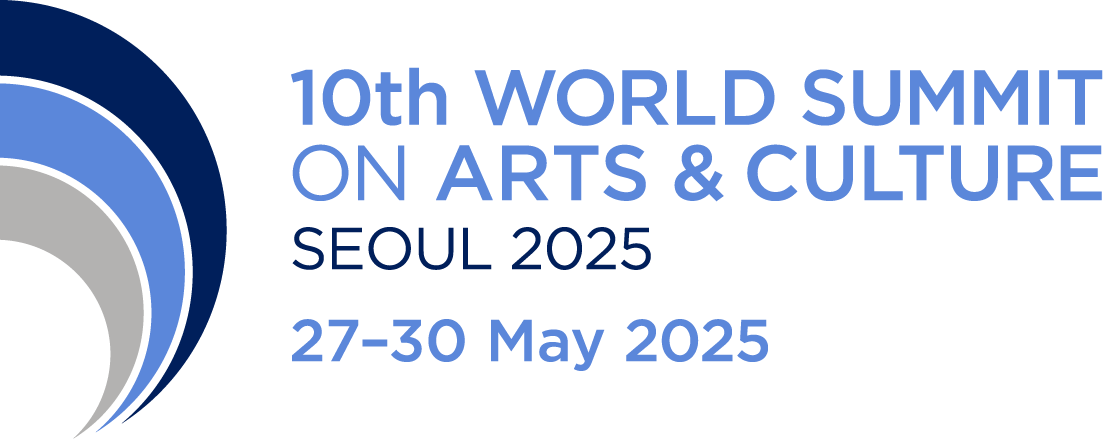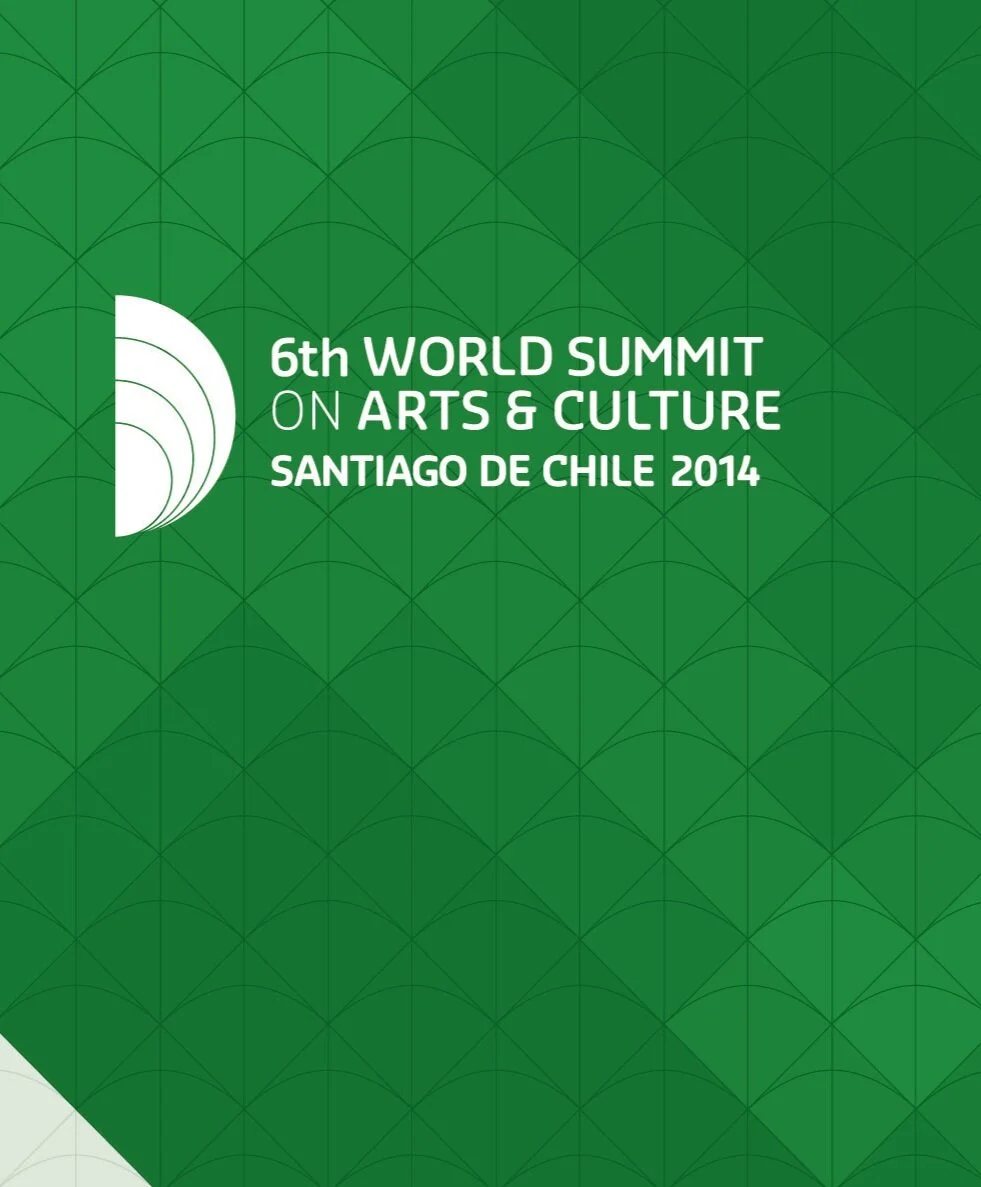Programme
The 6th World Summit programme explored the theme Creative Times: new models for cultural development and addressed how globalisation, shifts in social and economic development and new forms of communication generated an array of challenges and opportunities within the cultural field, with an impact that transcends the sector. During the programme delegates discussed the role of culture in the post-2015 development agenda, the arts and environmental sustainability, how government can encourage a more active engagement with the private sector, improving advocacy arguments and practices, and making effective use of new technologies to support the making and distribution of art.
The 6th World Summit was programmed by Magdalena Moreno Mujica, former Head of International Affairs at the National Council for Culture and the Arts (CNCA), Chile; IFACCA Board Member; and CEO of Australia-based Kultour, Australia’s national body supporting cultural diversity in the arts. In 2014, Ms Moreno joined the International Federation of Arts Councils and Culture Agencies as Deputy Director, and in 2017 was appointed Executive Director.
Programme Participants
The 6th World Summit on Arts and Culture included keynote addresses from:
Dr Sonia Montecino (Chile), an academic and anthropologist who spoke to the theme Multiple Scenarios of culture: dilemmas in the Inclusion and Exclusion of Symbolic representations and considered the processes of globalisation and global markets; reflected on the role the individual to create different ways to inhabit the world and culture as an agent for social cohesion and including differences in multicultural contexts; and situated the conversation in the Chilean context, with particular attention to economic liberalism and the experiences of women, immigrants, Indigenous people, and other minority social groups.
Hayes Raffle (USA), Product and Interaction Designer for Google, who spoke to the theme Technologies for Creative Expression and considered a future in which photos become not just memories for the individual, but messages for future generations; the role of the State to encourage innovation and safeguard heritage; and to foster conditions for creative freedom and access to culture for younger generations.
Karl Johnstone (New Zealand), Director of New Zealand’s Maori Arts and Crafts Institute, who invited delegates to reculturalise commerce; capture knowledge through material culture; and consider sustainable development through three pillars, including the role of education, cultural development, and product development.
The programme also included a closing presentation via video from artist Ai Wei Wei (China) who recorded a special message for the 6th World Summit and its delegates.
The programme featured more than 60 speakers, including:
Carlos Aldunate (Chile)
Pablo Allard (Chile)
Architecture and Dean Faculty of Architecture and Art, Universidad del Desarrollo
Antonio Altamirano (Chile)
Director of Festival, Cielos del Infinito
Roberto Ampuero (Chile)
Minister President of National Council, Culture and the Arts of Chile
Magdalena Aninat (Chile)
Contents and Projects Director, National Council for Culture and Arts of Chile
Alejandro Aravena (Chile)
Architect and Director of Elemental
Patricia Arévalo (Chile)
Director, Regional Council for Culture and the Arts of Arica-Parinacota
Rawand Arqawi (Palestine)
Acting School Coordinator at the Freedom Theatre
Peter Bazalgette (England)
Chair of Arts Council England and President of The Royal Television Society
Cristóbal Bianchi (Chile)
Šarūnas Birutis (Lithuania)
Minister of Culture, Republic of Lithuania
Massimo Bray (Italy)
Minister of Culture and Tourism, Italy
Mabel Causarano (Paraguay)
Minister - Executive Secretary of Culture, which depends directly from the Republic's Presidency
Ricardo Brodsky (Chile)
Executive Director, Museum of Memory and Human Rights
Alejo Campos (El Salvador)
Director of International Relations and Cooperation of the Presidency's Culture Secretary
María Caridad Mederos (Cuba)
National Director of Cultural Programs, Ministry of Culture
Fernando Carrión (Ecuador)
Coordinator of Program Studies of the City, Latin American Social Sciences Institute (FLACSO)
Jota Castro (Belgium/Peru)
Curator Emergency Pavilion Venice Biennale 2013
Pablo Chiuminatto (Chile)
Doctor in Philosophy, Associate Professor, Faculty of Letters, Universidad Catolica de Chile. Advisor in the Metropolitan Region of the National Council for Culture and the Arts
Alan Davey (UK)
CEO, Arts Council England
Nancy Duxbury (Portugal)
Director, Art Moves Africa (AMA)
Mohamed El Sawy (Egypt)
Former Minister of Culture and philanthropist, Director of Culture Wheel Foundation
Erica Elk (South Africa)
Executive Director, Cape Craft and Design Institute
Silvia Fernández (USA)
Program Director of International Coalition of Sites of Conscience
Beatriz García (England)
Head of Research, Institute of Cultural Capital, University of Liverpool
Sarah Gardner (Australia)
Executive Director, IFACCA
Ana Magdalena Granadino (El Salvador)
Secretary of Culture for the Presidency of El Salvador
Tony Grybowski (Australia)
CEO, Australia Council for the Arts
Mónica Guariglio (Argentina)
National Director of Cultural Policy and The International Cooperation, Ministry of Culture
Georgia Haddad Nicolau (Brazil)
Director of Management, Entrepreneurship and Innovation at the Creative Economy Secretariat of the Ministry of Culture of Brazil
Diane Haylock (Belize)
CEO, National Institute of Culture and History
Stefan Hilterhaus (Germany)
Artistic Director, PACT Zollverein
Marcus Hughes (Australia)
Programs Manager - Kultour / Adjunct Associate Professor, Moondani Balluk Academic Unit, Victoria University
Sunil Iyengar (USA)
Director, Office of Research & Analysis, National Endownment for the Arts
Sonia Jaroslavsky (Argentina)
Spectators Education Program, Ministry of Education, Government of the City of Buenos Aires
Avril Joffe (South Africa)
Executive Director of CAJ: Culture, Arts and Jobs, Sub-Saharan Africa
Carole Karemera (RwandaParaguay)
Director of the Pan African Dance Festival and Deputy Secretary General of Arterial Network, Arterial Network
Ammar Kessab (Algeria)
Governance Expert at the African Development Bank (AfDB)
Cecilia Heejeong Kim (Korea)
Artist and Member of Arts Council of Korea (ARKO) National Director of Cultural Programs, Ministry of Culture
Patricia Kistenmacher (Argentina)
International Representative of the Latin -American Network on Art for Social Transformation
Arjo Klamer (Netherlands)
Professor in the Economy of Arts and Culture at Erasmus University Rotterdam
Frances Koya Vaka’uta (Fiji)
Lecturer in Education, University of the South Pacific
Kathy Lai (Singapore)
CEO Singapore Arts Council, Singapore Arts Council
José María Lasalle (Spain)
State Secretary of Culture of Spain
Faith Liddell (Scotland)
Director Festivals Edinburgh, Festivals Edinburgh
Teresa Lizaranzu (Spain)
General Director of Politics for Cultural Industries and Book in the Secretary of State for Culture of the Ministry of Education, Culture and Sport
Hernán Lombardi (Argentina)
Minister of Culture of the City of Buenos Aires and Co-President of the Culture Committee of United Cities and Local Governments
Rei Maeda (Japan)
Coordinator of Echigo-Tsumari Art Triennale, Echigo-Tsumari ArtTriennale
Deborah McCormik (New Zealand)
Director of Scape Public Art, Biennial of Public Art in Christchurch
Christa Meindersma (Netherlands)
Director of Prince Claus Fund, Prince Claus Fund
Juan Meliá (México)
President of Intergovernmental Committee of lberescena
Felipe Mella (Chile)
Professor Justin O’connor (Australia)
Professor of Cultural Economy, University of South Australia
Ángel Mestres (Spain)
Director of Transit Projectes, Transit Projectes
Heraldo Muñoz
United Nations Assistant Secretary General and United Nations Development Programme Regional Director for Latin America and the Caribbean
Bárbara Negrón (Chile)
General director, Observatory for Cultural Policy (OPC)
Manuel Obregón (Costa Rica)
Minister of Culture, Ministry of Culture and Youth
Leonardo Ordóñez (Chile)
Director, Santiago Creativo
Justo Pastor Mellado (Chile)
Executive Director of Parque Cultural Valparafso, Parque Cultural Valparafso
Alejandra de la Paz (México)
National Coordinator, Cultural Heritage and Tourism
Rachel Perkins (Australia)
Managing Director Black Fella Films, Black Fella Films
Juan José Price (Chile)
Professor of Economics and Cultural Policy, University of Chile
Andrés Rodríguez (Chile)
Executive Director, Teatro Municipal of Santiago
Jorge Rojas (Chile)
Carmen Romero (Chile)
Director, Teatro a Mil Foundation and Santiago a Mil International Festival
Bruce Seaman (USA)
Associate Professor of Economics, former Department Chair, and a Research Associate at the Andrew Young School of Policy Studies at Georgia State University
Anupama Sekhar (India)
Deputy Director of the Culture Department, Asia-Europe Foundation (ASEF)
Graham Sheffield (UK)
Director of Arts for the British Council
Robert Sirman (Canada)
Director and CEO of Canada Council for the Arts, Canada Council for the Arts
Minna Sirno (Finland)
Director, Arts Promotion Centre Finland
Paulina Soto (Chile)
Research Director, Patrimonia Consultores Chile
Jack Stanley (Canada)
Mahani Teave (Chile)
Director Programs, Fogo Island Arts
Todd Temkin (USA/Chile)
Poet and President of Fundación Valparaíso
Luis Miguel Usuga (Colombia)
Cultural expert and former Secretary of Culture of Medellin, Colombia
Mike Van Graan (South Africa)
Executive Director of the Cape Town-based African Arts Institute (AFAI)
Elisabeth Vaneveld (New Zealand)
Executive Director of Big Idea Charitable Trust, Big Idea Charitable Trust
Enrique Vargas (Mexico)
Deputy Director, Cultural Affairs Division, General Secretariat for Iberia-America (SEGIB)
Pedro Vasconcellos (Brazil)
Director of Citizenship and Cultural Diversity, responsible for Puntos de Cultura (Point of Culture Program), Ministry of Culture
Tarisi Vunidilo (Vanuatu)
Secretary General for the Pacific Islands Museums Association (PIMA)
Marcus Westbury (Australia)
Founder of Renew Australia and Renew Newcastle
Alejandra Wood (Chile)
Executive Director, Centro Gabriela Mistral (GAM)
Mitsuhiro Yoshimoto (Japan)
Director of Center for Arts and Culture, NLI Research Institute and Board Member of Arts Council Tokyo
Madani Younis (UK)
Artistic Director of Bush Theatre, Bush Theatre
Ana Zuvela (Croatia)
Research Fellow at the Institute for International Relations
Cultural Programme
Alongside the conference programme, delegates participated in a programme of cultural events.
Opening Ceremony
The Opening Ceremony, held at Estación Mapocho Cultural Centre, included a tailored cultural programme that showcased Chile's many contrasts and celebrated its cultural diversity and geography, from the traditional to the contemporary. The programme featured performances by the National Folkloric Ballet of Chile (BAFONA), Lorenzo Aillapán -“BirdMan”, and the commissioning of a new contemporary work by Choreographer José Vidal and Co, accompanied by Chilean National Ballet (BANCH). Over the remaining days of the Summit, a cultural programme was designed in partnership with the Santiago a Mil International Festival, the largest contemporary performing arts festival and market in Chile and included theatre, dance and music events from Chile, Latin America and around the world.
Official Summit Dinner
In addition, the 6th World Summit included a dedicated gastronomy programme showcased during the Official Summit Dinner, support by Fundación Imagen de Chile; and an extensive programme of cultural experiences across theatre, performance, film, visual arts, libraries and museums, and cultural institutions of national significance including the Gabriela Mistral Centre (GAM) and the Museum of Memory and Human Rights.






